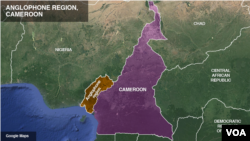Cameroon says three months after creating a commission to reintegrate separatist fighters who agree to disarm, only 20 rebels have surrendered. Separatists fear the commission may be a trap by the military to arrest and punish them.
Thirty-nine-year-old Julius, who for security reasons gives only his first name, is a motorcycle taxi driver in Cameroon’s capital, Yaounde — but only since November.
That is when he says he escaped from a village in the English-speaking northwest, after the military raided his rebel camp.
Julius says the military killed 13 of his fellow separatist fighters.
He has since given up on violence to fight for an independent, English-speaking state within Francophone Cameroon.
But Julius refuses to hand himself over to Cameroon’s commission to reintegrate rebel fighters because he does not trust authorities.
"What happens on the ground is that if one military man is killed, in vengeance they burn down villages," he said. "They have gone to the level of committing such atrocities to turn down now and blame it on the fighters on the ground. How do you imagine that those same fighters will trust that they will lay their arms and walk up to them. When they suspect, they shoot and kill."
Julius returned from Nigeria in 2017, he says, after studying at a university. He had no intention of becoming a separatist until the military, he claims, torched his house.
Cameroon’s military denies abuses against civilians in battling the rebels and accuses the separatists of committing atrocities.
Rights groups say both the military and separatists are guilty of brutalities in the three-year conflict, with noncombatants bearing the brunt of the violence.
But authorities admit thousands of young Cameroonians have become separatists.
In December, Cameroon created the committee to reintegrate Boko Haram terrorists and rebel fighters and who agreed to disarm.
But less than 20 separatists have handed themselves over to Cameroon’s two reintegration centers.
Sixtus Gabsa, manager of the reintegration center in the northwestern town of Bamenda, says rebels who want to disarm have nothing to fear.
"Those who want to think negatively think that it is a trap. There is no trap in it," he said. "I am giving you a guarantee, the head of state has given us a mandate to give our children the opportunity to come meet us so that they can stay in peace, live in peace so that we can take care of them and reinsert them in the society. We are even going to give them means to see how they can start a new life in a free and safe society."
Gabsa says the centers offer rebels treatment for injuries, job training, schooling, and resources to resettle them back into mainstream society.
But Counselor Denise Mbarga at the Center for the Peaceful Resolution of Conflicts in Yaoundé says the government needs to create trust. He says asking the separatists to disarm while carrying out military raids sends the wrong signal.
Mbarga says nothing much can be expected from the commission if the government does not change its strategy. He says authorities need to show political will to end the war by carrying out sincere dialogue with the people and rebels because the military solution is failing.
The separatists, who claim discrimination against the English-speaking minority in majority French-speaking Cameroon, have been fighting for an independent state since 2016.
The government says more than 1,200 people have been killed in the fighting but has dismissed the thought of giving up any sovereignty.









